Analyzing the Essential Elements for Valid Contract Formation in Law
VerifiedAdded on 2023/06/10
|9
|877
|230
Essay
AI Summary
This essay provides a detailed overview of the essential elements required for the formation of a valid contract in business law. It discusses key components such as offer, acceptance, consideration, mutuality of obligation, competency and capacity of the parties, and the importance of a written instrument, particularly under the statute of frauds. Each element is explained with examples to illustrate its significance in ensuring a legally binding agreement. The essay also highlights why each element is crucial for the validity and enforceability of a contract, emphasizing their role in creating a legally sound and equitable agreement between parties. Desklib offers a wealth of similar documents and study tools to aid students in understanding complex legal concepts.

BUSINESS LAW
NAME OF THE STUDENT
NAME OF THE STUDENT
Paraphrase This Document
Need a fresh take? Get an instant paraphrase of this document with our AI Paraphraser
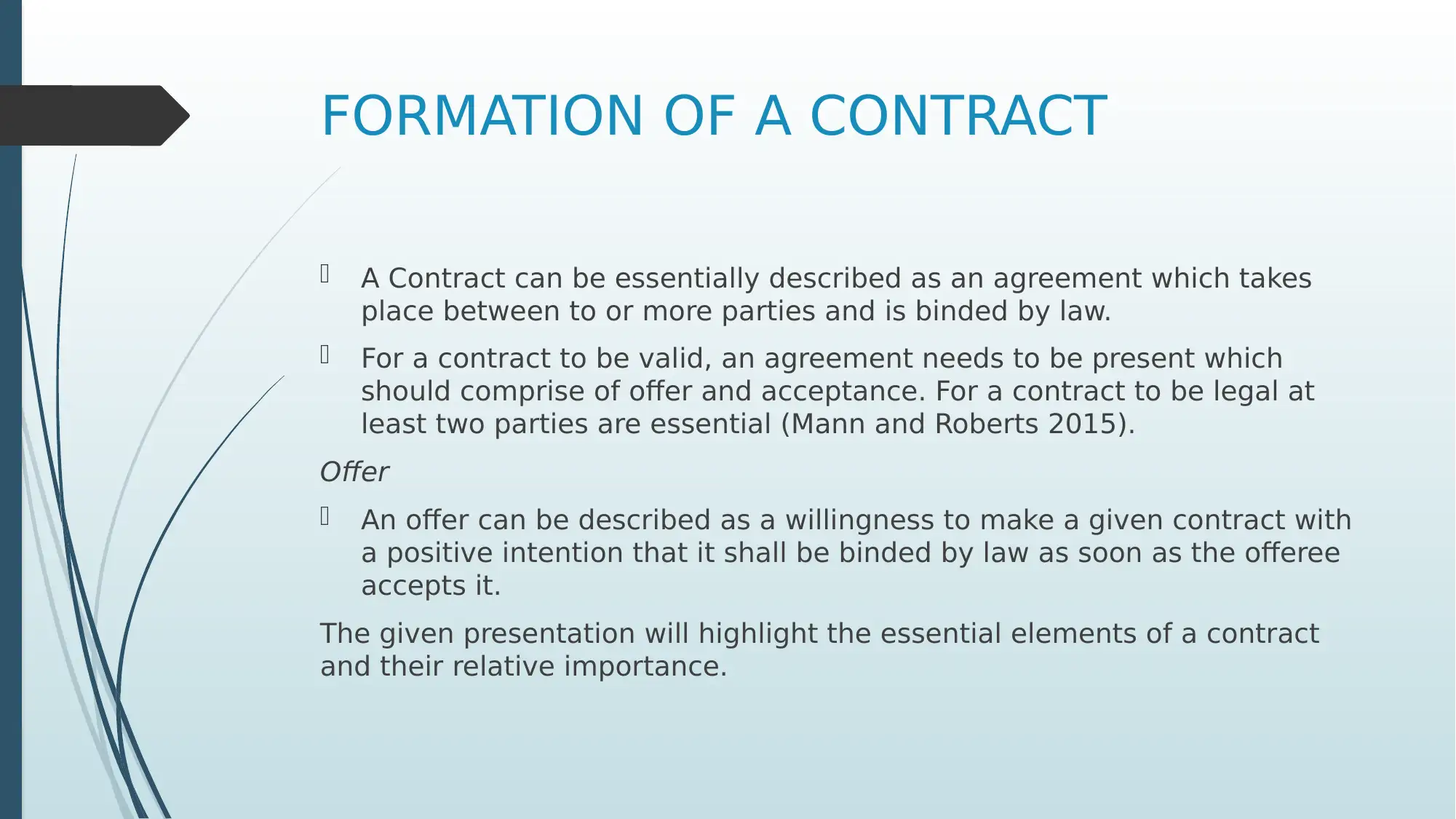
FORMATION OF A CONTRACT
A Contract can be essentially described as an agreement which takes
place between to or more parties and is binded by law.
For a contract to be valid, an agreement needs to be present which
should comprise of offer and acceptance. For a contract to be legal at
least two parties are essential (Mann and Roberts 2015).
Offer
An offer can be described as a willingness to make a given contract with
a positive intention that it shall be binded by law as soon as the offeree
accepts it.
The given presentation will highlight the essential elements of a contract
and their relative importance.
A Contract can be essentially described as an agreement which takes
place between to or more parties and is binded by law.
For a contract to be valid, an agreement needs to be present which
should comprise of offer and acceptance. For a contract to be legal at
least two parties are essential (Mann and Roberts 2015).
Offer
An offer can be described as a willingness to make a given contract with
a positive intention that it shall be binded by law as soon as the offeree
accepts it.
The given presentation will highlight the essential elements of a contract
and their relative importance.
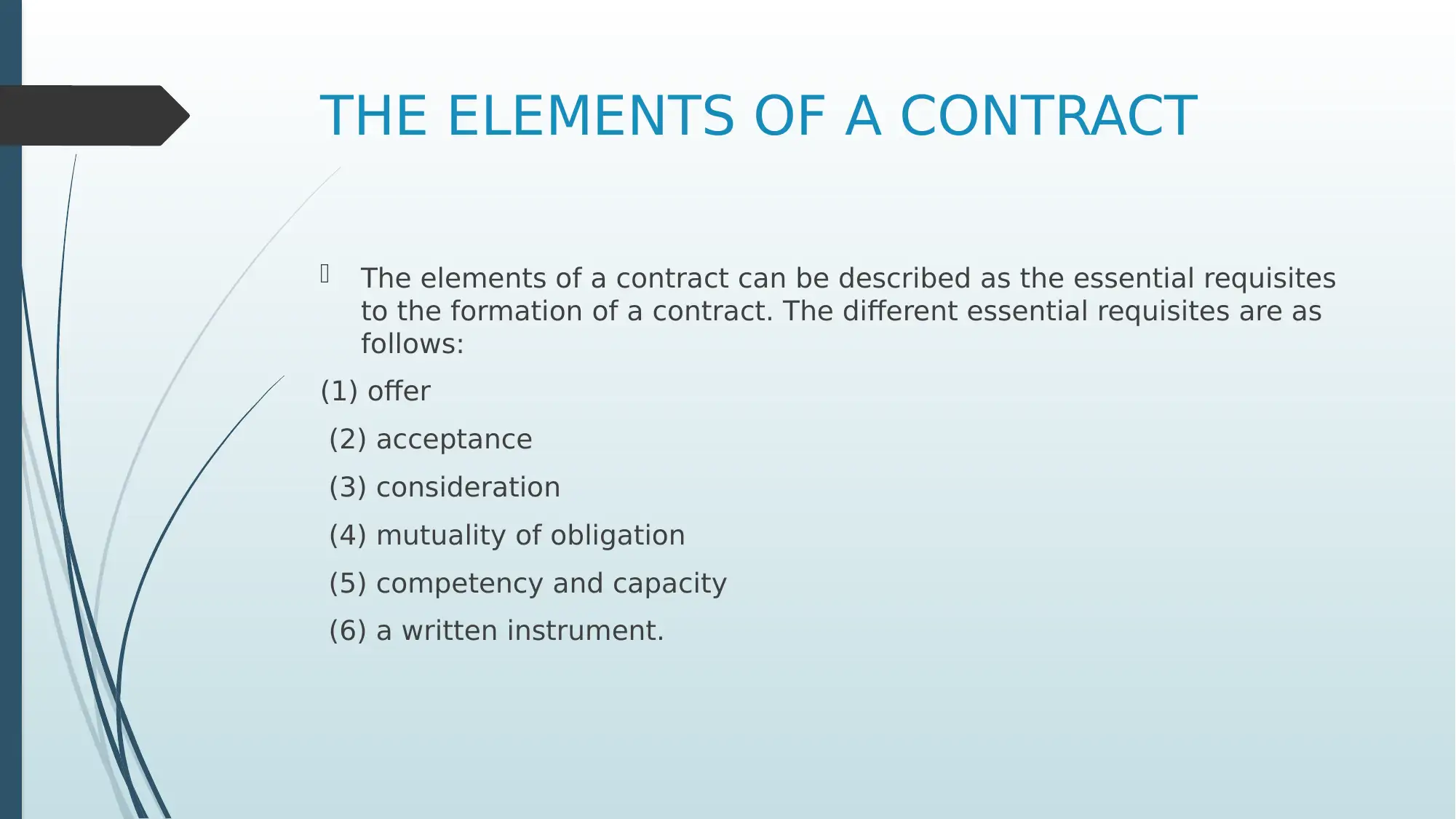
THE ELEMENTS OF A CONTRACT
The elements of a contract can be described as the essential requisites
to the formation of a contract. The different essential requisites are as
follows:
(1) offer
(2) acceptance
(3) consideration
(4) mutuality of obligation
(5) competency and capacity
(6) a written instrument.
The elements of a contract can be described as the essential requisites
to the formation of a contract. The different essential requisites are as
follows:
(1) offer
(2) acceptance
(3) consideration
(4) mutuality of obligation
(5) competency and capacity
(6) a written instrument.
⊘ This is a preview!⊘
Do you want full access?
Subscribe today to unlock all pages.

Trusted by 1+ million students worldwide

Offer
An offer can be described as a promise which is made to ensure a promise to do
something and promise a fair return for it.
For instance, a painter may offer to paint a house for $100 and this payment
shall be based on the condition that the painter is able to successfully complete
the job.
An offer is the beginning of a contract.
Acceptance
An acceptance can be defined as an agreement to the expression o the offer
which is generally made. It is an obligation that an acceptance needs to be
made in a specific manner (Miller 2015).
In case where an acceptance is considered valid when the offeree is aware of the
offer and has an intention to accept all related terms
An acceptance can be written or oral but needs to be generally written in nature.
An acceptance completes the offer.
An offer can be described as a promise which is made to ensure a promise to do
something and promise a fair return for it.
For instance, a painter may offer to paint a house for $100 and this payment
shall be based on the condition that the painter is able to successfully complete
the job.
An offer is the beginning of a contract.
Acceptance
An acceptance can be defined as an agreement to the expression o the offer
which is generally made. It is an obligation that an acceptance needs to be
made in a specific manner (Miller 2015).
In case where an acceptance is considered valid when the offeree is aware of the
offer and has an intention to accept all related terms
An acceptance can be written or oral but needs to be generally written in nature.
An acceptance completes the offer.
Paraphrase This Document
Need a fresh take? Get an instant paraphrase of this document with our AI Paraphraser
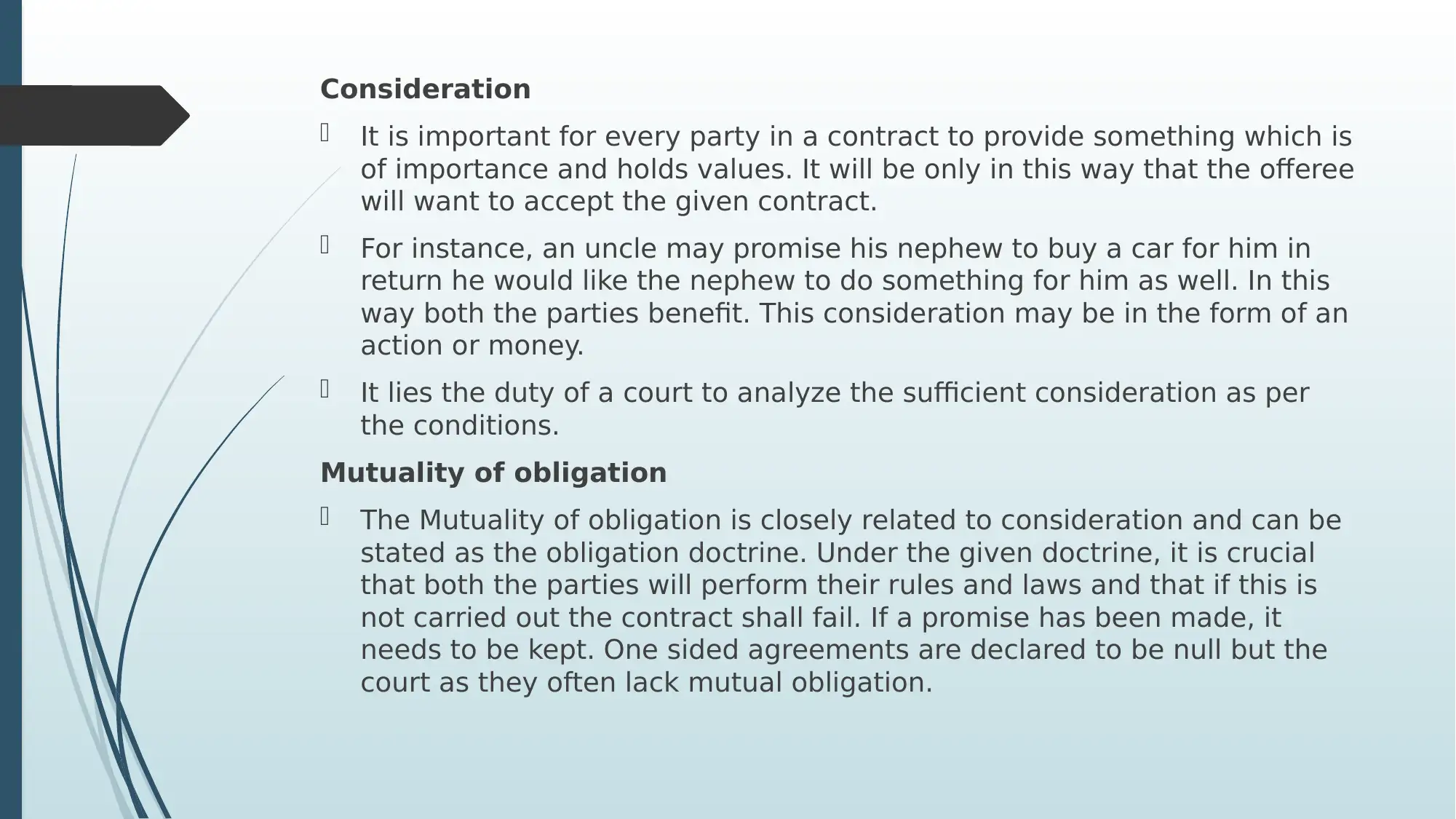
Consideration
It is important for every party in a contract to provide something which is
of importance and holds values. It will be only in this way that the offeree
will want to accept the given contract.
For instance, an uncle may promise his nephew to buy a car for him in
return he would like the nephew to do something for him as well. In this
way both the parties benefit. This consideration may be in the form of an
action or money.
It lies the duty of a court to analyze the sufficient consideration as per
the conditions.
Mutuality of obligation
The Mutuality of obligation is closely related to consideration and can be
stated as the obligation doctrine. Under the given doctrine, it is crucial
that both the parties will perform their rules and laws and that if this is
not carried out the contract shall fail. If a promise has been made, it
needs to be kept. One sided agreements are declared to be null but the
court as they often lack mutual obligation.
It is important for every party in a contract to provide something which is
of importance and holds values. It will be only in this way that the offeree
will want to accept the given contract.
For instance, an uncle may promise his nephew to buy a car for him in
return he would like the nephew to do something for him as well. In this
way both the parties benefit. This consideration may be in the form of an
action or money.
It lies the duty of a court to analyze the sufficient consideration as per
the conditions.
Mutuality of obligation
The Mutuality of obligation is closely related to consideration and can be
stated as the obligation doctrine. Under the given doctrine, it is crucial
that both the parties will perform their rules and laws and that if this is
not carried out the contract shall fail. If a promise has been made, it
needs to be kept. One sided agreements are declared to be null but the
court as they often lack mutual obligation.
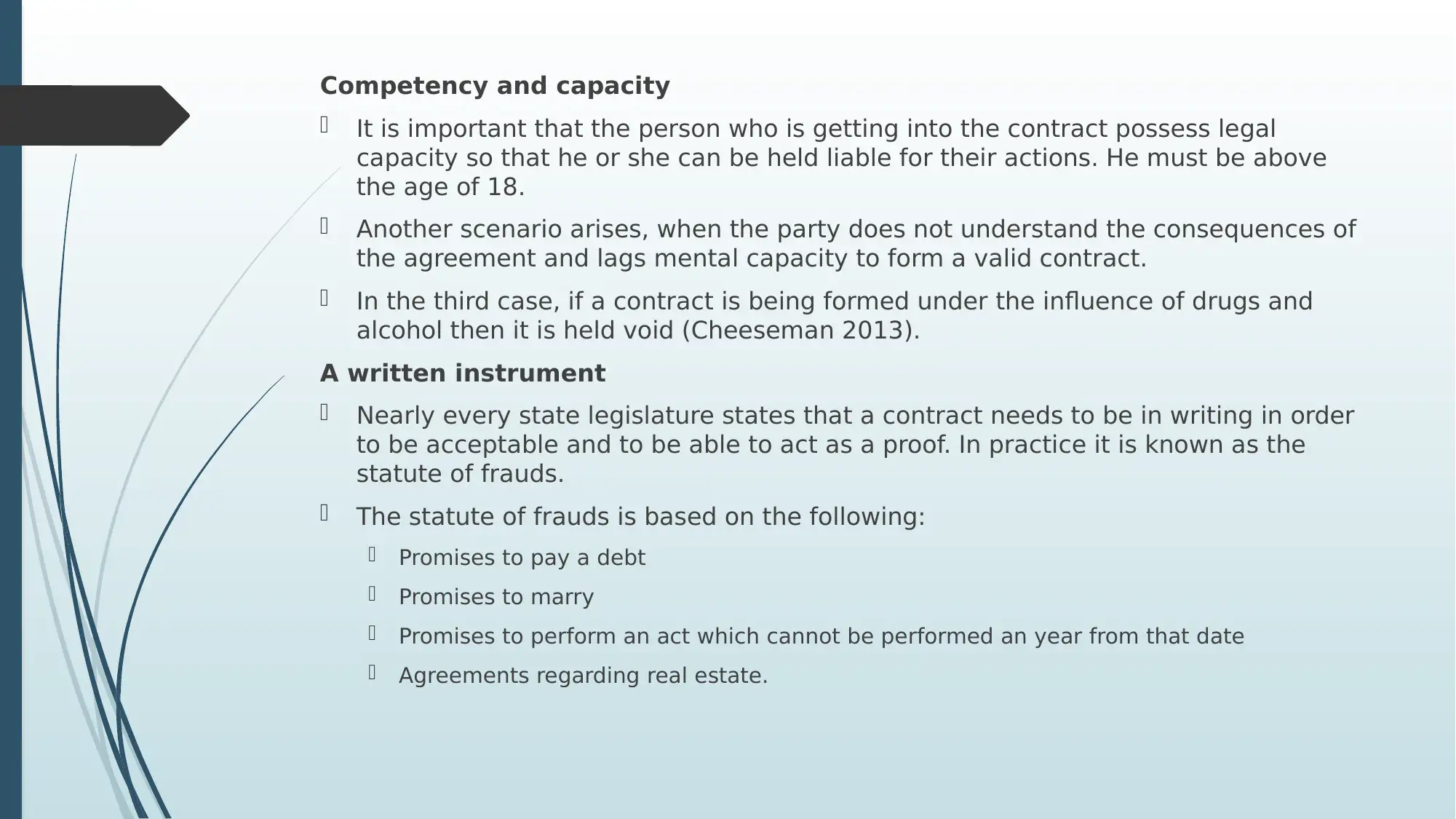
Competency and capacity
It is important that the person who is getting into the contract possess legal
capacity so that he or she can be held liable for their actions. He must be above
the age of 18.
Another scenario arises, when the party does not understand the consequences of
the agreement and lags mental capacity to form a valid contract.
In the third case, if a contract is being formed under the influence of drugs and
alcohol then it is held void (Cheeseman 2013).
A written instrument
Nearly every state legislature states that a contract needs to be in writing in order
to be acceptable and to be able to act as a proof. In practice it is known as the
statute of frauds.
The statute of frauds is based on the following:
Promises to pay a debt
Promises to marry
Promises to perform an act which cannot be performed an year from that date
Agreements regarding real estate.
It is important that the person who is getting into the contract possess legal
capacity so that he or she can be held liable for their actions. He must be above
the age of 18.
Another scenario arises, when the party does not understand the consequences of
the agreement and lags mental capacity to form a valid contract.
In the third case, if a contract is being formed under the influence of drugs and
alcohol then it is held void (Cheeseman 2013).
A written instrument
Nearly every state legislature states that a contract needs to be in writing in order
to be acceptable and to be able to act as a proof. In practice it is known as the
statute of frauds.
The statute of frauds is based on the following:
Promises to pay a debt
Promises to marry
Promises to perform an act which cannot be performed an year from that date
Agreements regarding real estate.
⊘ This is a preview!⊘
Do you want full access?
Subscribe today to unlock all pages.

Trusted by 1+ million students worldwide
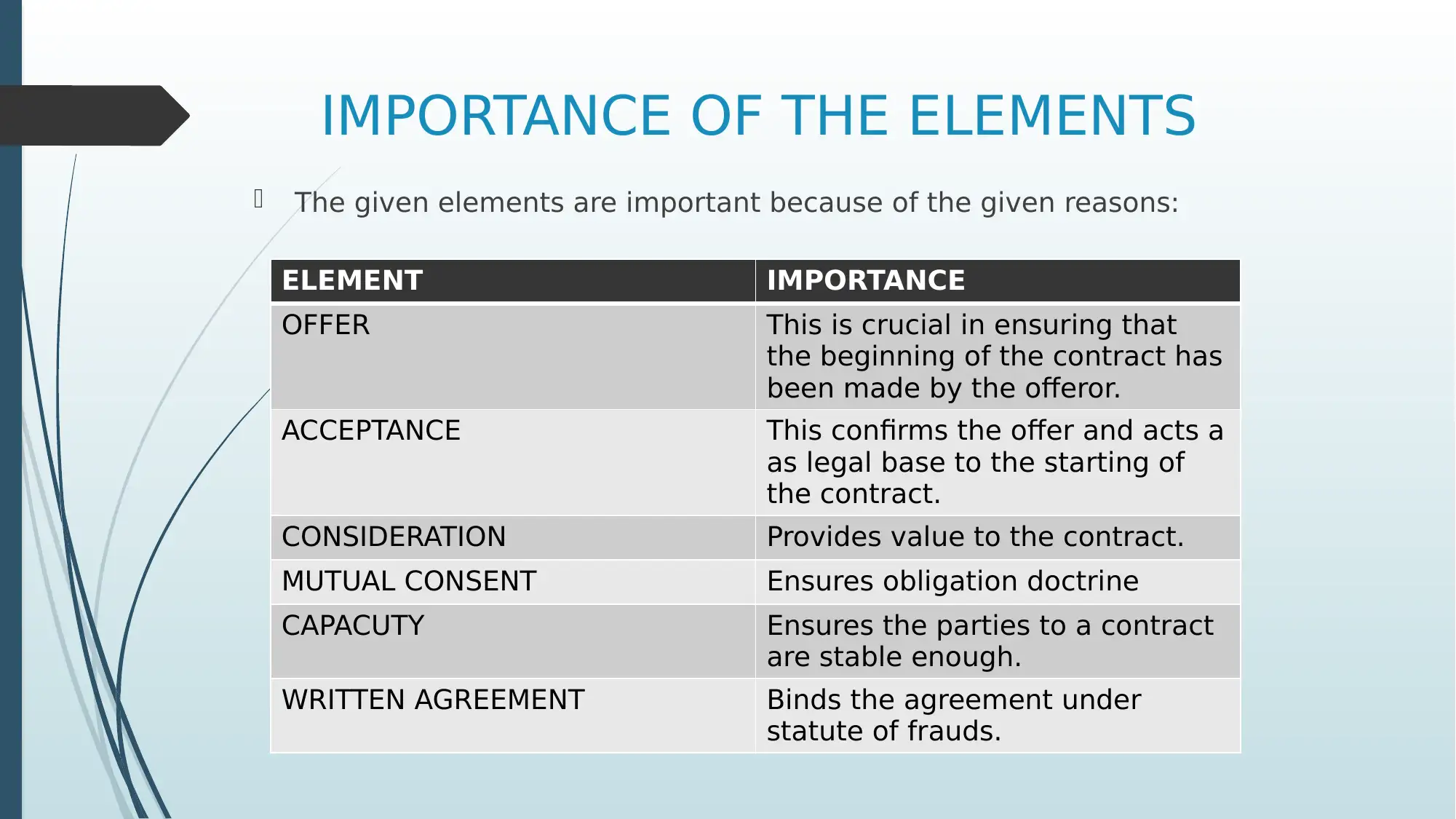
IMPORTANCE OF THE ELEMENTS
The given elements are important because of the given reasons:
ELEMENT IMPORTANCE
OFFER This is crucial in ensuring that
the beginning of the contract has
been made by the offeror.
ACCEPTANCE This confirms the offer and acts a
as legal base to the starting of
the contract.
CONSIDERATION Provides value to the contract.
MUTUAL CONSENT Ensures obligation doctrine
CAPACUTY Ensures the parties to a contract
are stable enough.
WRITTEN AGREEMENT Binds the agreement under
statute of frauds.
The given elements are important because of the given reasons:
ELEMENT IMPORTANCE
OFFER This is crucial in ensuring that
the beginning of the contract has
been made by the offeror.
ACCEPTANCE This confirms the offer and acts a
as legal base to the starting of
the contract.
CONSIDERATION Provides value to the contract.
MUTUAL CONSENT Ensures obligation doctrine
CAPACUTY Ensures the parties to a contract
are stable enough.
WRITTEN AGREEMENT Binds the agreement under
statute of frauds.
Paraphrase This Document
Need a fresh take? Get an instant paraphrase of this document with our AI Paraphraser
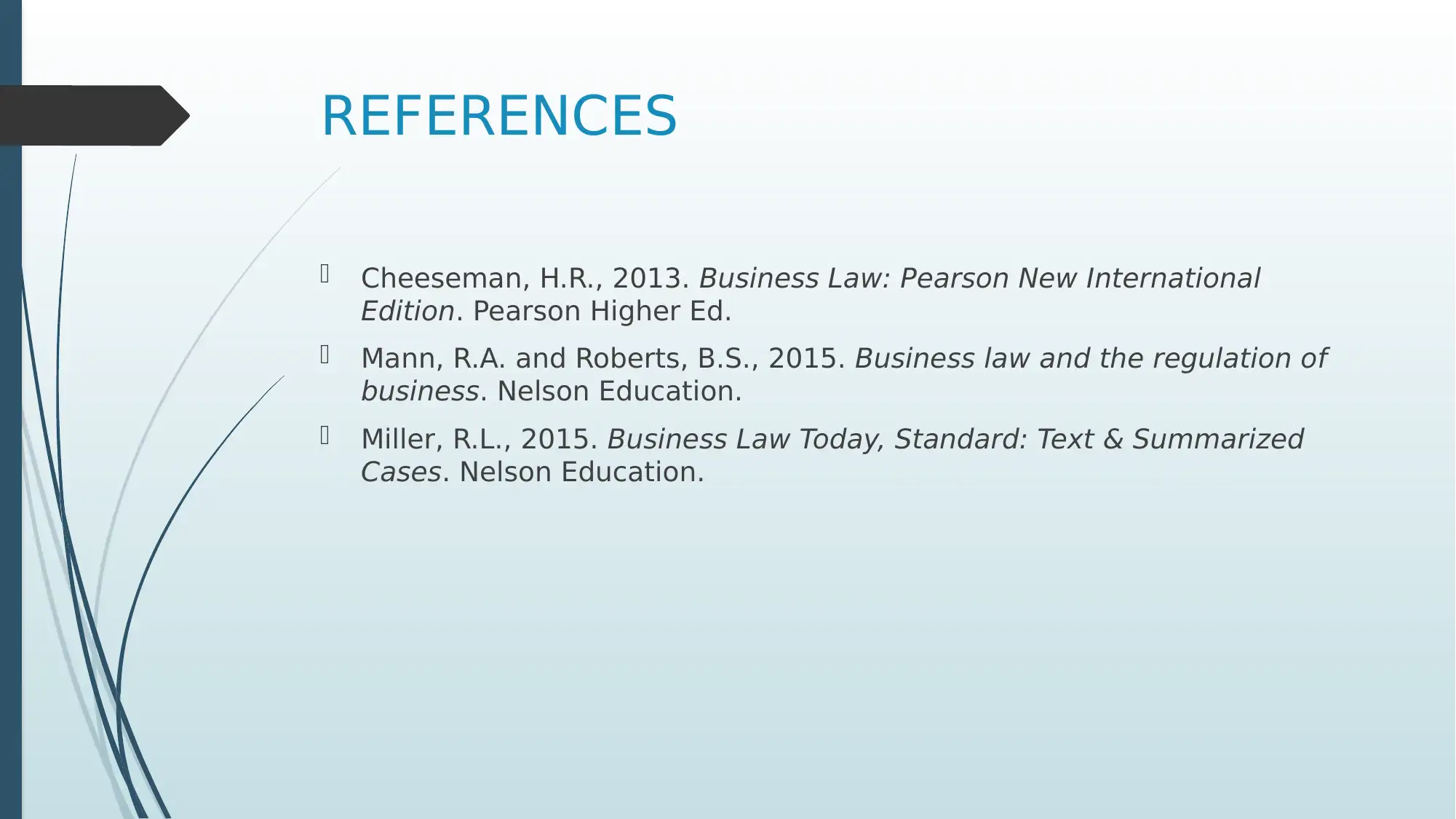
REFERENCES
Cheeseman, H.R., 2013. Business Law: Pearson New International
Edition. Pearson Higher Ed.
Mann, R.A. and Roberts, B.S., 2015. Business law and the regulation of
business. Nelson Education.
Miller, R.L., 2015. Business Law Today, Standard: Text & Summarized
Cases. Nelson Education.
Cheeseman, H.R., 2013. Business Law: Pearson New International
Edition. Pearson Higher Ed.
Mann, R.A. and Roberts, B.S., 2015. Business law and the regulation of
business. Nelson Education.
Miller, R.L., 2015. Business Law Today, Standard: Text & Summarized
Cases. Nelson Education.

⊘ This is a preview!⊘
Do you want full access?
Subscribe today to unlock all pages.

Trusted by 1+ million students worldwide
1 out of 9
Related Documents
Your All-in-One AI-Powered Toolkit for Academic Success.
+13062052269
info@desklib.com
Available 24*7 on WhatsApp / Email
![[object Object]](/_next/static/media/star-bottom.7253800d.svg)
Unlock your academic potential
Copyright © 2020–2026 A2Z Services. All Rights Reserved. Developed and managed by ZUCOL.




